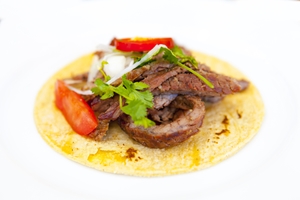 Many cooking school students, when exploring their potential employment opportunities in a post graduate setting, are drawn to the idea of starting or joining a food truck business. It’s a completely understandable sentiment; the business model of a food truck is attractive in that it allows younger chefs (or people without a huge amount of overhead capital) to break into the hospitality market. For anyone starting one of these mobile eateries, it seems fair to assume that the end goal would be to make enough money to open a sedentary, brick and mortar location. That has always been the vision for Verde Food Truck, one of Boulder’s most popular restaurants on wheels. According to The Daily Camera, the owners of Verde had their vision come to fruition earlier this September, as they expanded their practice to a permanent location.
Many cooking school students, when exploring their potential employment opportunities in a post graduate setting, are drawn to the idea of starting or joining a food truck business. It’s a completely understandable sentiment; the business model of a food truck is attractive in that it allows younger chefs (or people without a huge amount of overhead capital) to break into the hospitality market. For anyone starting one of these mobile eateries, it seems fair to assume that the end goal would be to make enough money to open a sedentary, brick and mortar location. That has always been the vision for Verde Food Truck, one of Boulder’s most popular restaurants on wheels. According to The Daily Camera, the owners of Verde had their vision come to fruition earlier this September, as they expanded their practice to a permanent location.
Verde’s history
The Daily Camera reports that Verde first opened for business in Boulder in 2011, when T.J. Ingraham and Mike Sethney turned their childhood dream into a business. Hailing from Arizona, the two had long dreamed of finding a way to enter the world of culinary arts and hospitality together. Being from the Southwest, the two friends shared a penchant for Mexican cuisine and, after gathering some initial capital and spending countless hours developing their business model, Verde was born. The truck, perhaps unsurprisingly, is painted almost entirely green and features a minimalist logo of the word ‘Verde’ spelled out in alternating shades of blue and orange. Over the past three years, the establishment quickly gained favor with residents of Boulder by serving fast, affordable and delicious burritos, tacos and enchiladas.
Moving on up
Graduating from a mobile dining establishment to a sedentary location comes with a great deal of benefits. First and foremost, the amount of food that a restaurant can produce on a daily basis greatly exceeds the capacity of a truck, allowing for a far higher profit potential as long as the customers continue to come. Also, considering the fact that the restaurant is in a fixed locale, the need to move around constantly in search of active customer demographics is immediately erased and replaced with a heightened potential for brand recognition via location. Perhaps the single most important benefit for Verde will be the ability to sell liquor, which is prohibited for food trucks in Boulder. That said, the move does not come without a great deal of cost. Even while minimizing expenses by using friends as contractors and handling much of the demolition themselves, the operation is estimated by the Daily Camera to cost at least $250,000.
What to expect
Verde’s new location will remain true to its food trucks roots while embracing new potential in a few ways. While the classic staples of the truck, such as burritos and tacos, will be available for purchase, the menu will also expand to feature items such as chile rellenos, Sonoran hot dogs and cheese crisps. Entrees at the new restaurant are expected to range from roughly $10-$14, making Verde a perfect location for casual dining with fantastic food.

